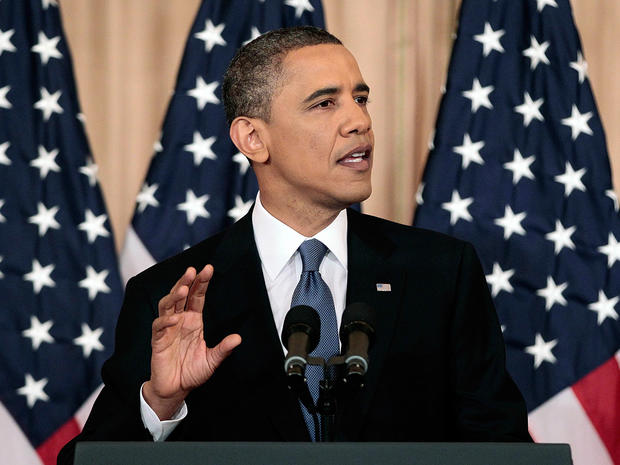Obama's Middle East rhetoric may ring hollow
In what the White House billed as a major speech Thursday, President Obama sought to place the United States firmly on the side of those pushing for democratic reforms in the Middle East and North Africa.
"There must be no doubt that the United States of America welcomes change that advances self-determination and opportunity," he said. "Yes, there will be perils that accompany this moment of promise. But after decades of accepting the world as it is in the region, we have a chance to pursue the world as it should be."
It was inspiring rhetoric designed to convince skeptics that after long helping prop up repressive regimes in the region, the United States is setting a new course. If America doesn't start speaking "to the broader aspirations of ordinary people," Mr. Obama said, it "will only feed the suspicion that has festered for years that the United States pursues our own interests at their expense." He added that "a failure to change our approach threatens a deepening spiral of division between the United States and Muslim communities."
Yet such grand rhetoric - which was not accompanied by the announcement of any major new policy initiatives - simply does not square with the messy reality of U.S. involvement in the region. The United States was relatively slow to rally behind successful democratic movements in Egypt and Tunisia because of its alliance with the repressive regimes of those countries; it just pledged $1 billion in aid to Jordan despite King Abdullah II's ability to simply dictate whatever laws he chooses. (Mr. Obama and Abdullah met in the Oval Office on Tuesday.) The United States has had little to say about its ally Saudi Arabia's persistent human rights violations; Mr. Obama did not even mention the country in his 45-minute speech.
And while the United States launched coordinated military action against Libya and has gotten tougher with Syria for attacks on anti-government protesters, it has largely turned a blind eye to similar actions in Bahrain, where government forces have opened fire on those demanding reform. That's widely believed to be because Bahrain is the home of a major U.S. Navy base.
Obama: America's future bound to Middle East
Mr. Obama did discuss Bahrain in his speech. After calling the nation a "long-standing partner," he said "we have insisted publicly and privately that mass arrests and brute force are at odds with the universal rights of Bahrain's citizens, and will not make legitimate calls for reform go away. The only way forward is for the government and opposition to engage in a dialogue, and you can't have a real dialogue when parts of the peaceful opposition are in jail."
But unless the United States follows that rhetoric with concrete action, it will likely ring hollow to Bahraini protesters. The enthusiasm that greeted Mr. Obama's speech to the Muslim world two years ago from Cairo eventually faded as reformers saw little change to U.S. policy; this speech is thus unlikely to be taken on the Arab streets as a sign that the United States will put democratic movements first. (Below, CBS News analysis of the speech.)
Mr. Obama acknowledged as much in his speech, and even defended America's old ways of doing things.
"For decades, the United States has pursued a set of core interests in the region: countering terrorism and stopping the spread of nuclear weapons; securing the free flow of commerce, and safe-guarding the security of the region; standing up for Israel's security and pursuing Arab-Israeli peace," he said. "We will continue to do these things, with the firm belief that America's interests are not hostile to peoples' hopes; they are essential to them."
He also provided his administration with an out when questions are raised about whether its actions square with his rhetoric, stating, "there will be times when our short term interests do not align perfectly with our long term vision of the region."
Such a line goes to the central contradiction in the speech: Mr. Obama both cast the United States as a champion of democratic movements and said that that the United States will sometimes side with the enemies of such movements to serve its own strategic interests. That's a defensible - and perhaps inevitable - position for a president to take. But it will do little to put to rest skepticism among those who see the United States as too-often acting in opposition to its stated ideals.
President Obama's Middle East speech (full text)

